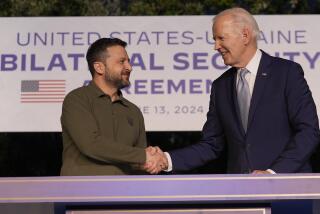Clinton Joins Launch of Balkan Pact
- Share via
SARAJEVO, Bosnia-Herzegovina — President Clinton flies into this war-scarred capital today, joining leaders from more than 30 other nations to launch an ambitious plan to lift Europe’s poor and politically troubled southeastern region into the continent’s mainstream.
The project, initially the brainchild of German Foreign Minister Joschka Fischer, is known as the Balkan “stability pact.” It was conceived at the height of the war in Kosovo as a way to end the cycle of conflict and ethnic enmity that has triggered four armed conflicts in the Balkans during the past decade and heightened tensions throughout the region.
At its core, the pact is simple: The eight countries that are included present plans to strengthen democracy, build market economies and boost cooperation among themselves, while the world’s rich and powerful nations--including the United States--pledge to help make it happen.
At today’s meeting, both sides are scheduled to unveil their opening commitments.
The initiative follows costly, long-term military commitments by Western countries to keep the peace, first in Bosnia-Herzegovina and now in Kosovo, a province of Yugoslavia’s main republic, Serbia.
“If what we have done in Bosnia and . . . Kosovo is to have lasting benefits, we have got to find a way to create closer unity among the Balkans states themselves and then with the region and Europe,” Clinton said recently.
The stability pact is modeled on the American-financed Marshall Plan, which helped lift Western Europe out of the ashes of World War II in what is widely recognized as the most successful assistance program ever executed. Not surprisingly, expectations among leaders in the region are extremely high.
Zivko Radisic, one of the three co-presidents of the summit’s host country, Bosnia, talked about a historic event that could transform his country, the Balkans and all of southeastern Europe.
“We expect that the summit will fulfill our hopes and bring permanent and stable peace, economic and democratic progress,” he said this week.
The eight participating regional countries are Hungary, Bulgaria, Macedonia, Romania, Croatia, Slovenia, Albania and Bosnia. For several of them, the pact also is in part a reward for standing with the West in its fight against Yugoslav President Slobodan Milosevic over his treatment of Kosovo’s majority ethnic Albanians.
So far, the only comments from U.S. officials on the pact’s costs have been that the Europeans will be footing most of the bill. European leaders have carefully avoided price tags.
While all participants agree on the summit’s main goal, not all agree with the United States that Serbia should be excluded until Milosevic is removed from power. Some European countries argue that Serbian cities controlled by opposition parties should qualify for some aid.
However, at a pre-summit briefing in Washington on Wednesday, National Security Advisor Samuel R. “Sandy” Berger made it clear that the U.S. wants to use the lure of the pact’s benefits as pressure for Milosevic’s removal.
“The message [to the Serbian people] will be simple,” he told reporters. “With Milosevic, you are excluded from the stability pact and isolated from the rest of Europe. With a government committed to democratic reform and international cooperation, we are prepared to help bring Serbia into the European mainstream.”
More to Read
Sign up for Essential California
The most important California stories and recommendations in your inbox every morning.
You may occasionally receive promotional content from the Los Angeles Times.










